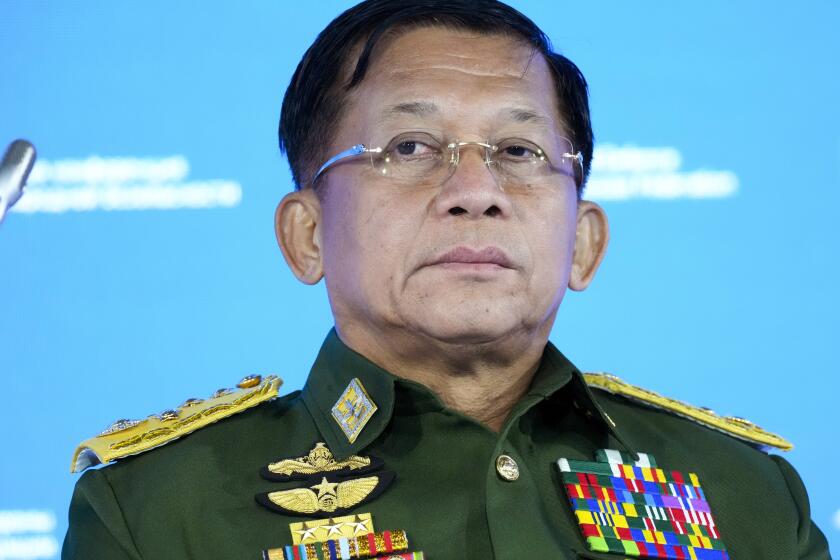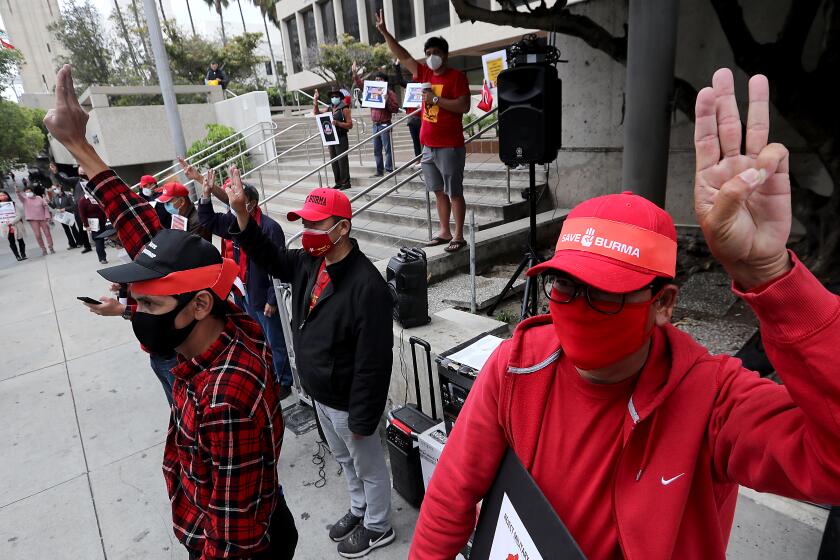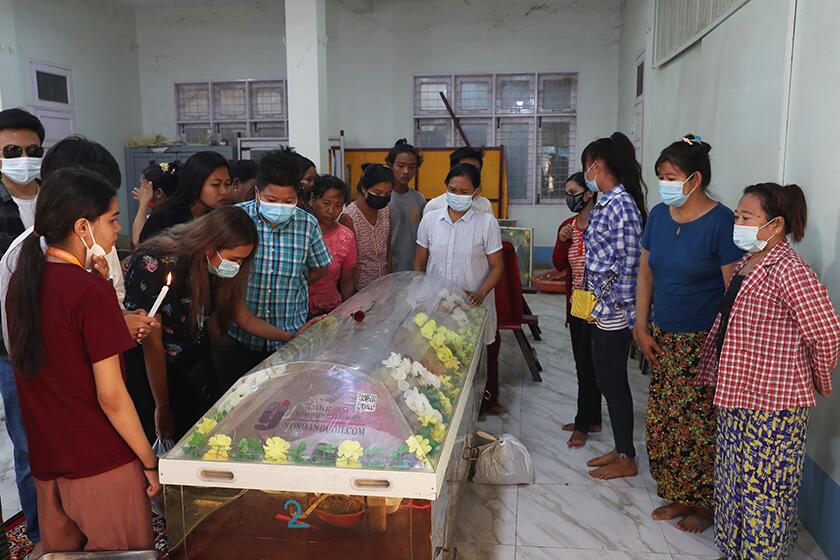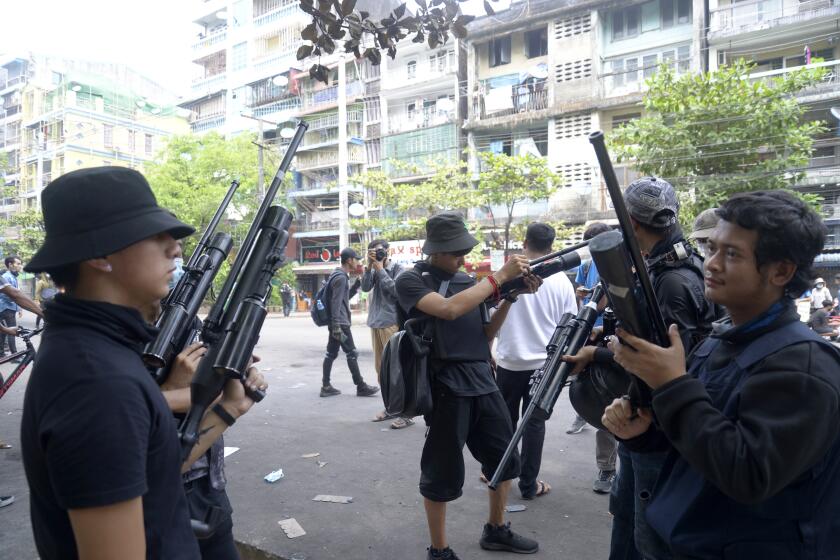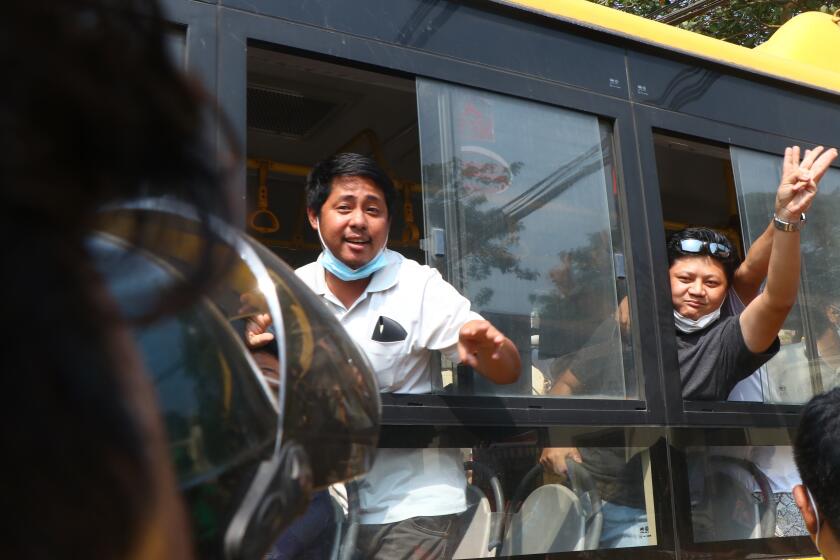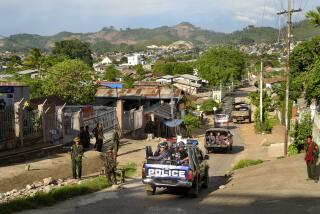Myanmar’s shadow government calls for an uprising against military rule
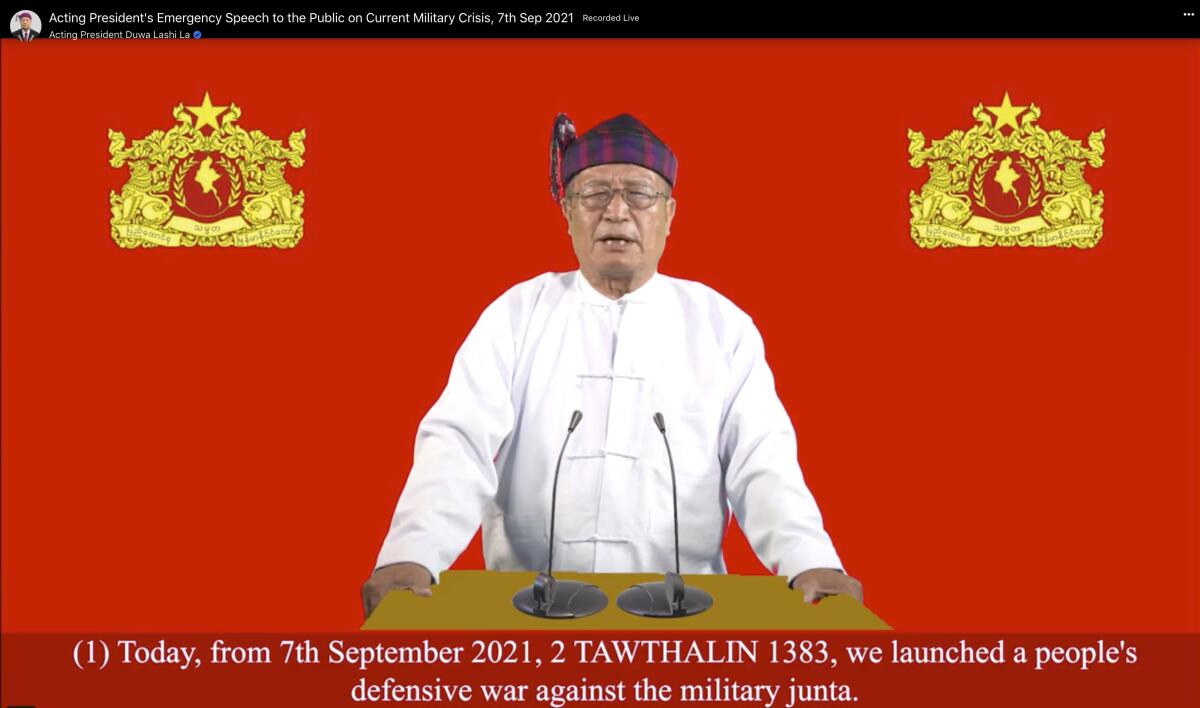
- Share via
BANGKOK, Thailand — The main underground group coordinating resistance to Myanmar’s military government called Tuesday for a nationwide uprising, raising the prospect of spiraling unrest.
The National Unity Government views itself as a shadow government, and is composed of elected lawmakers who were barred from taking their seats when the military seized power in February.
The group’s acting president, Duwa Lashi La, called for revolt “in every village, town and city in the entire country at the same time” and declared what he called a ”state of emergency.” A video of his speech was posted on Facebook.
Some 1,000 civilians have been killed in the seven months of clashes that followed the army takeover.
A spokesman for the ruling military downplayed the call for renewed protests. In a statement posted on the Telegram app by state television MRTV, Maj. Gen. Zaw Min Tun blamed exile media for exaggerating the opposition’s strength.
Myanmar has been racked by unrest since the military ousted the elected government of Aung San Suu Kyi. There has been a low-level insurrection in many urban areas and more serious combat in rural areas, especially in border regions where ethnic-minority militias have been engaging in serious clashes with government troops.
Six months after seizing power from the elected government, Myanmar’s military leader declared himself prime minister.
The shadow government’s prime minister, Mahn Winn Khaing Thann, said in a separate statement posted online that the call for an uprising was made because of “changing circumstances” that required the complete abolition of the ruling military government. He did not elaborate.
The call for an uprising came a week ahead of the convening of the United Nations General Assembly. The National Unity Government is hoping to have the assembly formally recognize Kyaw Moe Tun, who supports the opposition group, as Myanmar’s legitimate envoy to the world body. He had been the military government’s official representative, but switched his loyalty to the resistance in late February.
“It’s not uncommon for armed resistance forces to seek media attention ahead of a major event,” said David Mathieson, an independent analyst of Myanmar politics.
“Calls for an armed insurrection, beyond what is already unfolding, will likely [elicit] concern from many U.N. members states,” Mathieson said.
Burmese in the U.S. are protesting the brutal crackdown and urging global intervention. But it’s hard to overcome a lack of knowledge and interest.
Military spokesman Zaw Min Tun also suggested that the call for an uprising was timed to coincide with the U.N. General Assembly’s opening.
Mathieson said the call to arms was unlikely to be welcomed by the Assn. of Southeast Asian Nations, which has been seeking to broker an end to Myanmar’s crisis. The organization’s special envoy for Myanmar recently proposed a four-month ceasefire to allow for humanitarian activity.
Duwa Lashi La called on the ethnic militias, some of which have declared themselves in alliance with the resistance, to “immediately attack” government forces.
There were no immediate signs of heightened resistance activity, although solidarity was expressed online by some student groups and two of the most powerful ethnic militias, drawn from the Kokang and Kachin minorities. Fighting was reported in the eastern part of Myanmar controlled by the Karen, the ethnic group perhaps most sympathetic to the resistance.
Kyal Sin wore a T-shirt that said ‘Everything will be OK’ when she was shot by Myanmar security forces on the deadliest day since the military coup.
The National Unity Government is popular inside Myanmar, but its actual power and influence are hard to measure. It has frequently issued sweeping proclamations and policy statements declaring the military government and its actions invalid and illegal, but they’ve had little real-world effect. It controls no territory, does not directly control any armed force and has won no diplomatic recognition from foreign countries. Members of its Cabinet are in hiding inside Myanmar and in exile.
Fighting in the ethnic areas generally predates February’s military takeover, often by many decades.
The ethnic militias have an ambivalent relationship with the shadow government, which is closely identified with the former civilian government of Suu Kyi. Her ousted administration failed to offer regional minorities the local autonomy they have sought.
Mathieson noted that some of the militias have offered only limited opposition to the army rulers or are “sitting the whole post-coup crisis out.”
Anti-coup demonstrators are abandoning peaceful protest for armed resistance as the deposed civilian government appeals to ethnic rebels to join the fight. The United Nations warns of a ‘bloodbath.’
Duwa Lashi La’s statements, however, appeared to offer confidence in his group’s calls for resistance.
He warned people to avoid unnecessary travel, as well as to stock up on food and medicine, ahead of a “people’s revolution.”
At one usually quiet supermarket in Yangon, Myanmar’s biggest city, about 60 to 80 shoppers crowded checkout counters to purchase meat, rice, cooking oils and other essentials. There were reports of similar scenes in other food stores and open-air markets in the city.
It was not immediately clear if these crowded markets were driven by concerns over further unrest.
News Alerts
Get breaking news, investigations, analysis and more signature journalism from the Los Angeles Times in your inbox.
You may occasionally receive promotional content from the Los Angeles Times.
In his statement, military spokesman Zaw Min Tun dismissed “rumors” of people stocking up on essential commodities.
Duwa Lashi La said people should help the defense forces where they can, including with information about government military forces.
The resistance movement against the military takeover has established “people’s defense forces” in many areas, but they mostly operate locally and, when active, carry out small-scale guerrilla operations.
Myanmar’s military is one of the largest in Southeast Asia and has a reputation for toughness and brutality from years of jungle warfare. Although many Western nations maintain an arms embargo against Myanmar, the military buys equipment from countries such as Russia, China and Ukraine.
Protesters say labor strikes and civil disobedience are the only ways to dislodge the military dictatorship in Myanmar. It may mean pushing millions into poverty.
Charlie Thame, a political scientist at Thammasat University in Bangkok, the Thai capital, told the Associated Press that it would be wrong to underestimate the resistance’s strength or popular opposition to what he described as “generations of brutal oppression” by the military.
Mathieson suggested that the country was facing further instability.
“Either way, it portends even greater violence and suffering, regardless of any attainable political gain,” he said.
More to Read
Sign up for Essential California
The most important California stories and recommendations in your inbox every morning.
You may occasionally receive promotional content from the Los Angeles Times.
